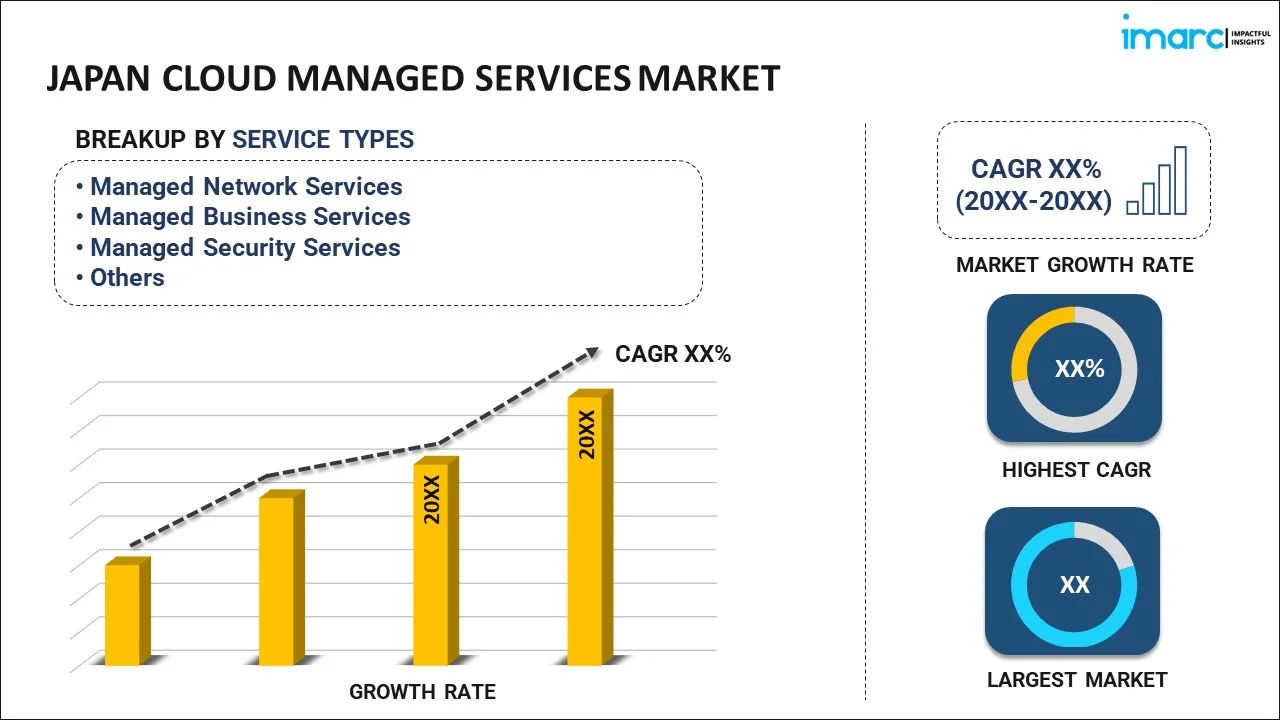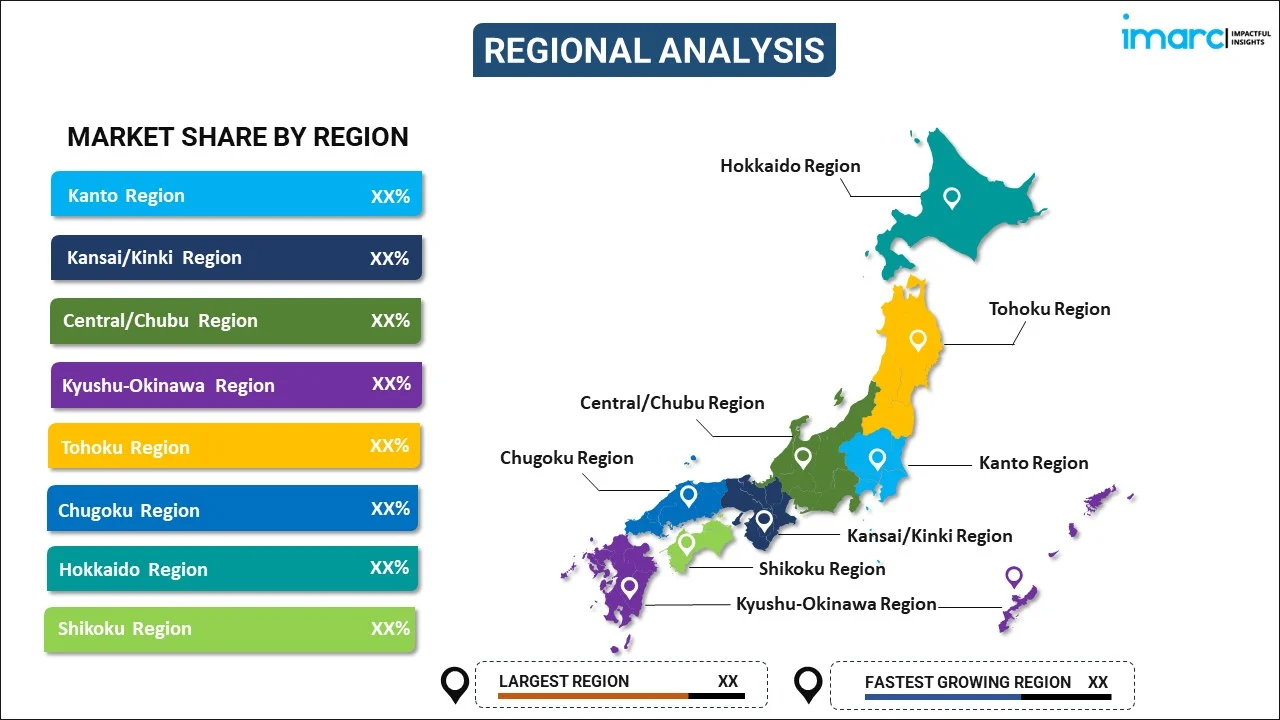
Japan Cloud Managed Services Market Report by Service Type (Managed Network Services, Managed Business Services, Managed Security Services, Managed Infrastructure Services, Managed Mobility Services, Managed Communication and Collaboration Services), Deployment Model (Private Cloud, Public Cloud), Organization Size (Large Enterprises, Small and Medium-sized Enterprises), Vertical (Retail and Consumer Goods, BFSI, Telecom, Government and Public Sector, Healthcare and Lifesciences, Manufacturing, Energy and Utilities, IT, and Others), and Region 2026-2034
Market Overview:
Japan cloud managed services market size reached USD 10.8 Billion in 2025. Looking forward, IMARC Group expects the market to reach USD 24.6 Billion by 2034, exhibiting a growth rate (CAGR) of 9.60% during 2026-2034. The aggressive push towards digital transformation, rapid expansion of the information technology (IT) infrastructure, widespread service adoption in the telecommunication sector, and implementation of proactive government initiatives and policies represent some of the key factors driving the market.
|
Report Attribute
|
Key Statistics
|
|---|---|
|
Base Year
|
2025 |
|
Forecast Years
|
2026-2034 |
|
Historical Years
|
2020-2025
|
| Market Size in 2025 | USD 10.8 Billion |
| Market Forecast in 2034 | USD 24.6 Billion |
| Market Growth Rate (2026-2034) | 9.60% |
Access the full market insights report Request Sample
Cloud managed services refer to a range of solutions and services offered by third-party providers, which enable businesses to manage and operate their cloud-based operations more efficiently. They include infrastructure management, security services, network operations, cloud automation, compliance and governance, data analytics, and application stacks. Cloud managed services are comprised of several components, such as cloud management platforms, operational support systems, and service delivery frameworks. They find extensive applications across various industries, including healthcare, banking, retail, manufacturing, education, and government. Cloud managed services offer cost reduction, enhanced efficiency, scalability, flexibility, improved security, disaster recovery, compliance support, expertise access, proactive monitoring, and strategic planning. In addition, they provide numerous advantages, such as streamlined operations, reduced complexity, better resource allocation, enhanced data management, increased agility, improved customer service, risk mitigation, competitive advantage, and focus on core business activities.
Japan Cloud Managed Services Market Trends:
The aggressive push towards digital transformation in Japan across industries is facilitating service demand as businesses increasingly adopt cloud-based platforms for operational efficiency. Additionally, the rapid expansion of information technology (IT) infrastructure in the country, which requires robust cloud managed services for seamless operation and management, is propelling the market growth. Besides this, the widespread service adoption in the telecommunications sector for data handling and network management is fueling the market growth. Furthermore, the implementation of proactive government initiatives and policies supporting cloud adoption is catalyzing the market growth. In addition, the escalating cybersecurity threats, prompting organizations to seek cloud managed services for better security and compliance, are contributing to the market growth. In addition, the ongoing shift towards remote working models, which has heightened the demand for cloud services for remote collaboration and data access, is supporting the market growth. Apart from this, continuous advancements in cloud technologies, including artificial intelligence (AI) and machine learning (ML) integration, are driving the market growth. Moreover, the expanding e-commerce sector, which requires robust cloud infrastructure for seamless operations, is positively influencing the market growth. Along with this, recent innovations in the energy sector, particularly smart grids and energy management, that rely heavily on cloud services for data management and analytics, are providing a considerable boost to the market growth. In line with this, the rising service adoption in the healthcare industry, owing to the increasing reliance on digital records and telemedicine solutions, is bolstering the market growth. Additionally, the widespread service utilization to store, manage, and analyze vast amounts of data generated by the Internet of Things (IoT) devices is strengthening the market growth.
Japan Cloud Managed Services Market Segmentation:
IMARC Group provides an analysis of the key trends in each segment of the market, along with forecasts at the country level for 2026-2034. Our report has categorized the market based on service type, deployment model, organization size, and vertical.
Service Type Insights:

To get detailed segment analysis of this market Request Sample
- Managed Network Services
- Managed Business Services
- Managed Security Services
- Managed Infrastructure Services
- Managed Mobility Services
- Managed Communication and Collaboration Services
The report has provided a detailed breakup and analysis of the market based on the service type. This includes managed network services, managed business services, managed security services, managed infrastructure services, managed mobility services, and managed communication and collaboration services.
Deployment Model Insights:
- Private Cloud
- Public Cloud
A detailed breakup and analysis of the market based on the deployment model have also been provided in the report. This includes private cloud and public cloud.
Organization Size Insights:
- Large Enterprises
- Small and Medium-sized Enterprises
The report has provided a detailed breakup and analysis of the market based on the organization size. This includes large enterprises and small and medium-sized enterprises.
Vertical Insights:
- Retail and Consumer Goods
- BFSI
- Telecom
- Government and Public Sector
- Healthcare and Lifesciences
- Manufacturing
- Energy and Utilities
- IT
- Others
A detailed breakup and analysis of the market based on the vertical have also been provided in the report. This includes retail and consumer goods, BFSI, telecom, government and public sector, healthcare and lifesciences, manufacturing, energy and utilities, IT, and others.
Regional Insights:

To get detailed regional analysis of this market Request Sample
- Kanto Region
- Kansai/Kinki Region
- Central/ Chubu Region
- Kyushu-Okinawa Region
- Tohoku Region
- Chugoku Region
- Hokkaido Region
- Shikoku Region
The report has also provided a comprehensive analysis of all the major regional markets, which include Kanto Region, Kansai/Kinki Region, Central/ Chubu Region, Kyushu-Okinawa Region, Tohoku Region, Chugoku Region, Hokkaido Region, and Shikoku Region.
Competitive Landscape:
The market research report has also provided a comprehensive analysis of the competitive landscape. Competitive analysis such as market structure, key player positioning, top winning strategies, competitive dashboard, and company evaluation quadrant has been covered in the report. Also, detailed profiles of all major companies have been provided.
Japan Cloud Managed Services Market Report Coverage:
| Report Features | Details |
|---|---|
| Base Year of the Analysis | 2025 |
| Historical Period | 2020-2025 |
| Forecast Period | 2026-2034 |
| Units | Billion USD |
| Scope of the Report | Exploration of Historical Trends and Market Outlook, Industry Catalysts and Challenges, Segment-Wise Historical and Future Market Assessment:
|
| Service Types Covered | Managed Network Services, Managed Business Services, Managed Security Services, Managed Infrastructure Services, Managed Mobility Services, Managed Communication and Collaboration Services |
| Deployment Models Covered | Private Cloud, Public Cloud |
| Organization Sizes Covered | Large Enterprises, Small and Medium-sized Enterprises |
| Verticals Covered | Retail and Consumer Goods, BFSI, Telecom, Government and Public Sector, Healthcare and Lifesciences, Manufacturing, Energy and Utilities, IT, Others |
| Regions Covered | Kanto Region, Kansai/Kinki Region, Central/ Chubu Region, Kyushu-Okinawa Region, Tohoku Region, Chugoku Region, Hokkaido Region, Shikoku Region |
| Customization Scope | 10% Free Customization |
| Post-Sale Analyst Support | 10-12 Weeks |
| Delivery Format | PDF and Excel through Email (We can also provide the editable version of the report in PPT/Word format on special request) |
Key Questions Answered in This Report:
- How has the Japan cloud managed services market performed so far and how will it perform in the coming years?
- What has been the impact of COVID-19 on the Japan cloud managed services market?
- What is the breakup of the Japan cloud managed services market on the basis of service type?
- What is the breakup of the Japan cloud managed services market on the basis of deployment model?
- What is the breakup of the Japan cloud managed services market on the basis of organization size?
- What is the breakup of the Japan cloud managed services market on the basis of vertical?
- What are the various stages in the value chain of the Japan cloud managed services market?
- What are the key driving factors and challenges in the Japan cloud managed services?
- What is the structure of the Japan cloud managed services market and who are the key players?
- What is the degree of competition in the Japan cloud managed services market?
Key Benefits for Stakeholders:
- IMARC’s industry report offers a comprehensive quantitative analysis of various market segments, historical and current market trends, market forecasts, and dynamics of the Japan cloud managed services market from 2020-2034.
- The research report provides the latest information on the market drivers, challenges, and opportunities in the Japan cloud managed services market.
- Porter's five forces analysis assist stakeholders in assessing the impact of new entrants, competitive rivalry, supplier power, buyer power, and the threat of substitution. It helps stakeholders to analyze the level of competition within the Japan cloud managed services industry and its attractiveness.
- Competitive landscape allows stakeholders to understand their competitive environment and provides an insight into the current positions of key players in the market.
Need more help?
- Speak to our experienced analysts for insights on the current market scenarios.
- Include additional segments and countries to customize the report as per your requirement.
- Gain an unparalleled competitive advantage in your domain by understanding how to utilize the report and positively impacting your operations and revenue.
- For further assistance, please connect with our analysts.
 Request Customization
Request Customization
 Speak to an Analyst
Speak to an Analyst
 Request Brochure
Request Brochure
 Inquire Before Buying
Inquire Before Buying




.webp)




.webp)












